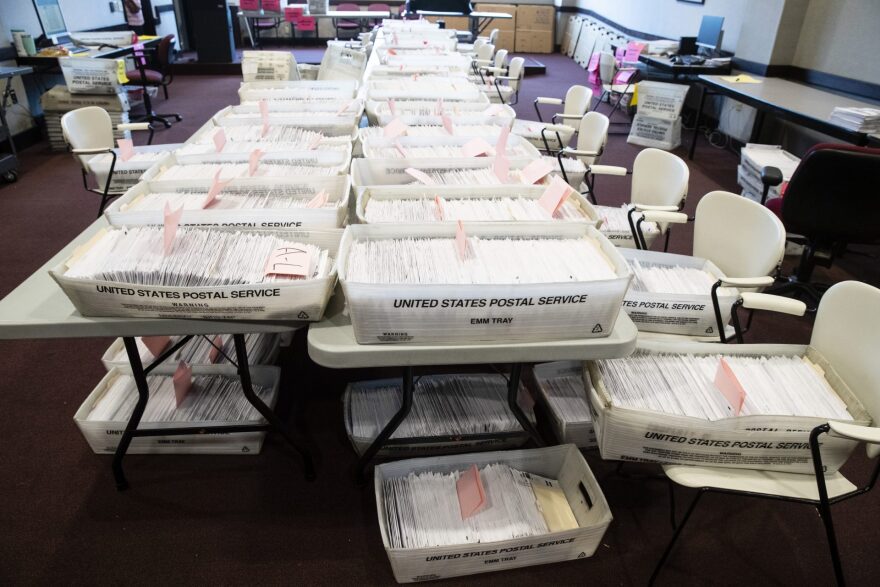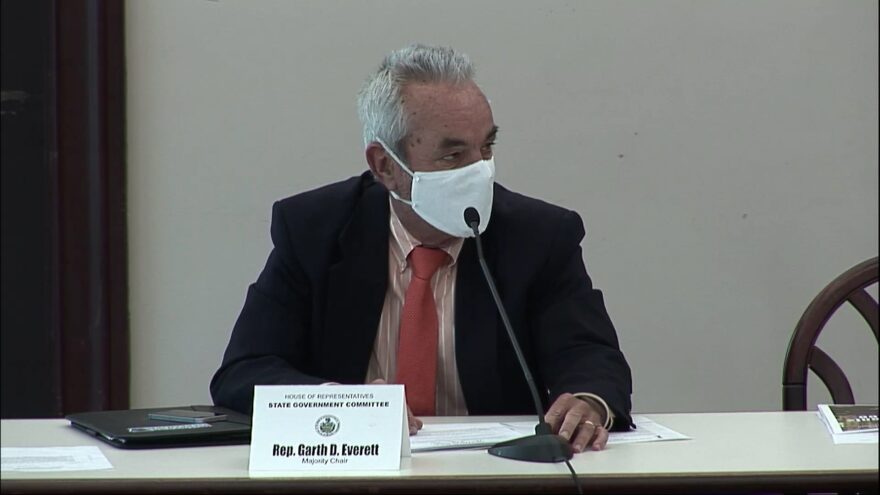Just weeks before the presidential election, Pennsylvania lawmakers still haven’t made a change to state voting laws that county election directors and nonpartisan good government groups say would greatly speed up the vote count – a crucial factor, they say, in combating efforts to undermine results in the swing state.
The change would let election offices start processing mailed ballots, known as pre-canvassing, before 7 a.m. on Election Day.
House Bill 2626, which cleared the chamber Sept. 2, would create that change. But only three Democrats voted for it. A veto pledge from Gov. Tom Wolf followed. And HB2626 sat in the Senate Appropriations Committee for nearly a month before this week’s session — which ended Tuesday without public discussion of the election code.
“It’s been frustrating, observing that there haven’t been really any constructive discussions about this, that we can tell, in public or behind closed doors,” said Pat Christmas, policy director at nonpartisan good government think tank Committee of 70. “The time that the counties would have to process these ballots – that’s a purely administrative change that should not have any implications one way or another, on one party’s … ability to win votes or not.”
Some stakeholders confirmed private discussions about the issue happened as recently as Tuesday. But lawmakers’ spokespeople wouldn’t provide specifics on when or if they might act, what still could change and why they can’t agree.
“We’ve talked with them, but – and again, I’m speculating here, because it’s very hard to tell – I’m not sure the discussions are even organized enough to be part of, at this point,” said Lisa Schaefer, executive director of the County Commissioners Association of Pennsylvania.
The legislature is due back Oct. 19.
“You’re talking about a very, very small window to get anything done,” Schaefer said.
There’s still time for changing pre-canvassing to help counties, but the window has already closed or soon will on other changes – like drop boxes or naked ballots – that stakeholders might want in exchange for supporting the earlier start, she said.
“Then you’re talking about the voter experience and causing confusion. Which is something nobody wants,” Schaefer said.
Pa.’s high stakes
Directors have been asking to begin pre-canvassing before Election Day since April, ahead of a vote-by-mail surge predicted for the primary. At the time, lawmakers punted. They did the same thing after the June 2 primary because they wanted data to inform election code changes. They’ve since received that data.
Pa. experienced the anticipated uptick in voting by mail during the primary amid the pandemic, and forecasts a more dramatic surge Nov. 3. Higher turnout could be further complicated by a mail system slowdown that wasn’t a factor earlier this year.
Vote by mail increased in other states, too. But the stakes might be highest in Pennsylvania, given the electoral votes in play, 44,000-vote margin in the last presidential contest and the resulting barrage of lawsuits that — with a couple unresolved — still could alter foundational voting procedures mere weeks from Election Day.
“It’s mystifying to see this train coming at us, the counties, the voters – and for the legislature not to do anything about it,” Christmas said. “If Pennsylvania happens to have electoral votes that … could be the decisive ones in a presidential election — if that is the case, we’re asking for just an incredible amount of scrutiny during election week, and potentially beyond that if some ballots are being challenged.”
Lessons learned?

Counting lasted days or weeks after the primary in certain counties. Some have invested in equipment – such as envelope openers — to cut the time it takes to process a ballot.
“I really think it’s going to be a matter of days, it’s certainly not going to be weeks,” said Jonathan Marks, deputy secretary for elections and commissions in the Pennsylvania Department of State. “And I think we may see that the counties will complete their tabulation and counting earlier than they did in the primary.”
Marks spoke on WITF’s Smart Talk Tuesday morning. The episode was dedicated to voting, with Secretary of State Kathy Boockvar joining Marks.
About halfway through the show, state Rep. Garth Everett (R-Lycoming) called in.
Everett, HB2626 sponsor and outgoing House State Government committee chair, started by praising the DoS officials and then moved on to recent policy developments.
He said he was surprised that a recent split state Supreme Court decision on a lawsuit from the Pennsylvania Democratic Party invalidated mailed ballots that arrive without their second internal secrecy envelope (so-called “naked ballots”). He seemed to view the ruling as an overreach by the Democrat-stacked court that could disenfranchise voters over a minor misstep.
“They filled out their ballot correctly, they filled out the verification correctly. And they simply forgot the inside envelope,” Everett said. “We are an outlier.”
Everett also remarked on the same court declining to relax rules for third-party ballot delivery.
“This sudden concern about who’s dropping off mailed ballots, … may be a little bit misplaced, after you’ve gone through the whole process to get a mail in ballot in the first place,” Everett said.
After a couple minutes, host Scott LaMar interjected: “Counties want to start counting ballots before the election. That would take legislative action. Will they get that legislative action?”
Everett noted the House bill he sponsored includes that provision, but ultimately deferred to legislative leaders on what happens next.
“It’s my hope the Senate will act on those this week,” he said, meaning by the end of Tuesday.
That didn’t happen.
Everett didn’t return calls for comment later Tuesday.

What’s next
Jason Gottesman, spokesman for House Republican majority leader Kerry Benninghoff (R-Centre), said Tuesday he doesn’t expect session to resume before Oct. 19, remotely or otherwise. He also wasn’t aware of discussions about HB2626 – but said “the House did its job” by passing it, and the administration should do more to keep the process going.
“There’s a product in the Senate,” Gottesman said. “There’s more to be done on that than just saying you’re going to veto it.”
Mike Straub, spokesman for Speaker Bryan Cutler (R-Lancaster), said lawmakers discussed the issue as recently as Tuesday but declined to provide further details. Closed-door talks continued Wednesday, according to The Associated Press. Rep. Kevin Boyle (D-Philadelphia/Montgomery) also filed a bill that day that would let counties begin opening ballot envelopes.
Confirmation from lawmakers – including Wolf and Senate leadership for both parties – that they are talking about changing the election code before Nov. 3 is nothing new. They’ve been saying this since the summer.
Bill Patton, spokesman for House Minority Leader Frank Dermody, faulted Republicans for the most recent delay because they “again insisted on giving people less time to apply to vote by mail.”
CCAP’s Schaefer said she doesn’t know what the sticking points are.
“It really seems to be all over the place,” she said. “And I’m not even sure there’s entirely agreement on what the pre-canvass period should look like, if that even goes forward.
Wolf’s spokeswoman Lyndsay Kensinger said Tuesday the governor wants lawmakers to vote through a “clean bill” that starts pre-canvassing before Election Day.
That was the focus of 2626, originally.
Then, the House agreed to a late-stage amendment from Everett that included some non-starters for Democrats such as banning drop boxes and letting poll watchers serve anywhere in the state.
The state Supreme Court’s Sept. 17 decision legalized drop boxes and upheld rules restricting poll watchers to their home counties; however, the GOP has asked the U.S. Supreme Court to intervene before Nov. 3. And President Donald Trump’s re-election campaign is seeking both rule changes through a federal lawsuit filed in July. A ruling could come any day now.
“At this point in the game, it’s critical that we eliminate all the disputed things,” Boockvar said Tuesday. “Ninety percent of that bill [2626] … is disputed.”
‘Last call’
Gottesman highlighted security provisions such as filming the pre-canvassing – something some counties already do, often because they’re livestreaming (as in Philadelphia and Delaware County).
House Democrats say they support codifying DoS guidelines that require drop boxes to be tamper- and waterproof, monitored by security cameras and emptied daily by two election workers. Most counties offering drop boxes are following those rules already – and some that aren’t installing boxes say they opted out, at least in part, due to DoS guidance.
But Democrats also say they won’t agree to the full extent of what they say Republicans want: live monitoring of boxes with film available for daily review, if desired, by county party chairs, because counties don’t have time to do it, according to Dermody’s spokesman Patton.
In the meantime, Christmas says his group is moving onto other priorities.
“We put in our last call, with the quote, unquote, election integrity committee,” Christmas said, referring to Everett’s resolution stopped by the House’s emergency suspension last week. “We may try one more nudge. But otherwise, we’re just going to kind of leave it alone.”
Read more from our partners, WITF.




